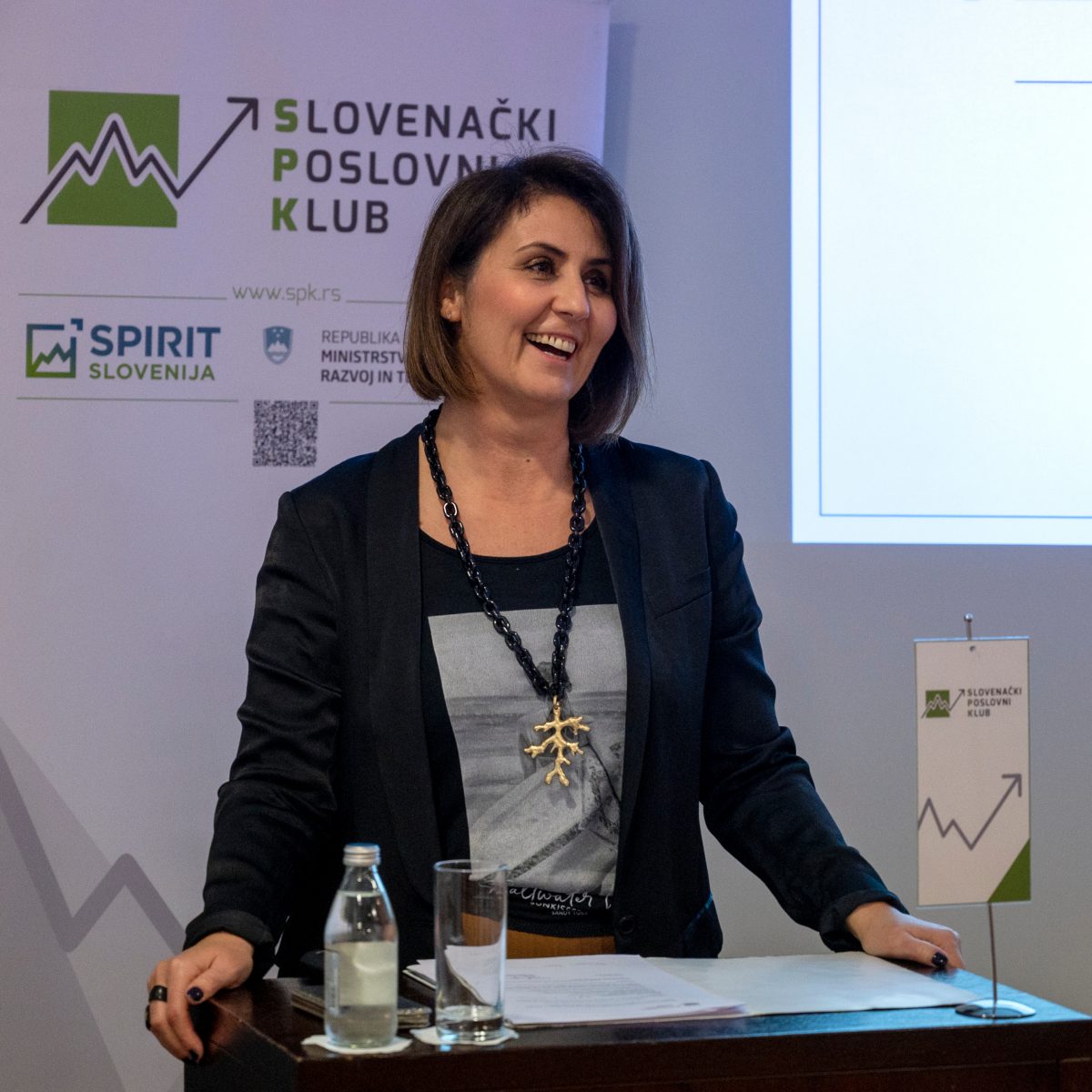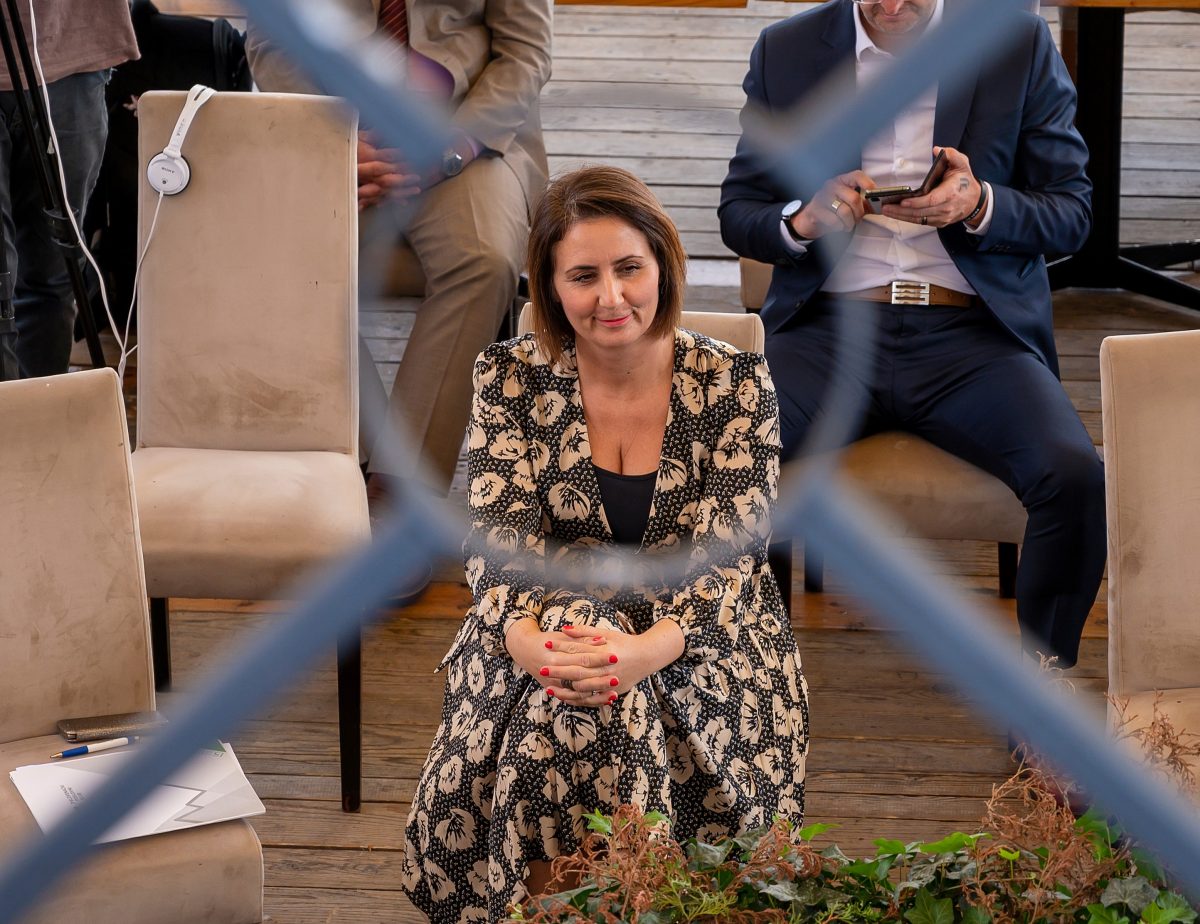It is always, including today, very important for the Government to listen to the business community and take into account their needs to mitigate the negative effects of the coronavirus peak we are currently in with additional and specific measures
“The SBC’s activities on networking and connecting members, on providing contacts and working one-on-one are carried out extensively out via modern technologies. However, I have to underline that we cannot wait to start organizing events again where attendees will be present in person while we are fostering the good atmosphere that usually prevails in the Slovenian Business Club and to which we have been accustomed to for the past 17 years,” says Danijela Fišakov, president of the Slovenian Business Club (SBC).

Danijela Fišakov, President of the SBC
The economies of Slovenia and Serbia have been both hit by the pandemic. What are the forecasts for next year?
Unfortunately, the whole world was affected by the pandemic, including the countries in this region. After a good economic start, the lockdown sent the economies of both countries downhill. In its latest report, the European Bank for Reconstruction and Development (EBRD) predicted that Serbia’s GDP could fall by 3.5 per cent this year, while economic growth of three per cent could be achieved next year.
The Government of Serbia and the line ministry, on the other hand, forecast a smaller decline in GDP, i.e. of about 1%. The EBRD notes that the impact of Covid-19 in Serbia is less harsh than in some comparable countries. This is partly due to the high share that the basic product production has in total production. At the same time, in its autumn forecast for 2020, the Institute of Macroeconomic Analysis and Development of the Republic of Slovenia predicted that the Slovenian GDP will decline by 6.7%, followed by a recovery in the next two years. Economic activity, as this forecast predicts, will reach the pre-epidemic level only in 2022.
What do you think about the measures devised by the Serbian Government and how much are Slovenian companies affected by the crisis?
Slovenian companies in Serbia are part of the Serbian economic milieu and share the destiny of other companies in this area. At the onset of the crisis, the SBC, together with other business and associations, chambers of commerce and business clubs, addressed the Ministry of Finance, on behalf of the business community in Serbia, with a joint request to facilitate business operations of companies during the state of emergency by reducing certain imposts and postponing the payment of others. We asked for the concrete support of the Serbian Government, and our suggestions were taken on board to the greatest extent.
“Without additional government assistance, some sectors will find it very difficult to survive on their own to the extent that existed antebellum”
During the state of emergency, the government’s measures significantly facilitated the business of micro, small and medium-sized enterprises first and foremost, i.e. those companies that are most vulnerable in such situations. Business people estimate that these intervention measures were excellent for mitigating the initial shock. However, the crisis is still ongoing. Unfortunately, we are witnessing a new wave of the coronavirus contagion and undoubtedly, the economy still needs help. Also, the adopted measures were linear and related to the widest set of business entities. Some of these entities, on the other hand, have encountered additional specific problems as a result of the pandemic. It is always, including today, very important for the Government to listen to the business community and take into account their needs to mitigate the negative effects of the coronavirus peak we are currently in with additional and specific measures.
What will the economy look like next year, and which sectors do you think will be the most affected?
From the very beginning of the global epidemic, tourism, hotel industry, catering, a large segment of transport and event organization, i.e. the sectors whose functioning depends on the fluctuation of a large number of people, have been affected the most. The longer this pandemic lasts, the deeper these sectors will sink. Without additional government assistance, some sectors will find it very difficult to survive on their own to the extent that existed antebellum.
In this regard, I must underline positive practices of the Government of Slovenia, which has announced and is already implementing the sixth set of measures to help the economy. Once the pandemic ends, the whole world, including our region, will certainly commit itself to the recovery of the entire economy, especially the endangered sectors, but this will not be an easy and simple job. I hope that this nightmare will pass as soon as possible and that we will emerge from it victorious, that is, as healthy people because only healthy people can work at full capacity and make their full contribution.

Danijela Fišakov, President of the SBC
Slovenia and Serbia traditionally have excellent economic relations. What will stagnate, and what can be improved in trading between the two countries?
Slovenian-Serbian relations are traditionally good and are constantly developing and deepening. The volume of trade between the economies of Slovenia and Serbia has long shown a continuous and significant upward trend. According to the official Slovenian statistics, the value of the trade (between the two countries) reached 1.6 billion euro in 2019, and in the first eight months of 2020, it amounted to one billion euro. This value can be much higher and more significant in the future because there are great opportunities to achieve that. Information technology, agriculture, environment and construction sectors are still far from reaching their maximum in cooperation.
“Information technology, agriculture, environment and construction sectors are still far from reaching their maximum in cooperation”
Slovenia will take over the EU presidency in the second half of 2021. What priorities are you going to have in terms of the economy?
Apart from being a strong and reliable partner of Serbia in economic cooperation, Slovenia wholeheartedly supports Serbia’s accession to the EU. The economy is one of the areas of the highest importance and interest, so the influence that the Slovenian presidency of the EU can have on it is, of course, something that business people are focused on. However, representatives of state policy are more apt to talk about specific strategic positions and future priorities. In any case, I sincerely hope that during the Slovenian presidency of the EU, the main topic will not be fighting the coronavirus, but finding ways for successful economic recovery after the pandemic.
What should be the priorities of the Serbian Government in terms of improving the investment environment and the economy?
Serbia is becoming more attractive and its environment for doing business is improving. It is important now that the state does not stop with the ongoing implementation of reforms at all levels, and that it continues with their practical implementation. The pandemic-related problems are not local and specific but global and cannot be an excuse to stop. The imperative of the Serbian state economic policy must be focused on reducing bureaucracy, improving the tax system as well as increasing the efficiency of public administration. Corruption could never be small, and procedures are never simplified enough.
Even in present conditions, you are managing to organize events, online seminars and panel discussions. How quickly did you adapt and how did you choose the topics?
Following the instructions of medical professionals and the orders of the Serbian authorities, the SBC’s activities have changed somewhat since the beginning of the state of emergency, i.e. they have adapted to the new situation. We stopped organizing events and meetings that require the physical presence of attendees, but in June, while still adhering to all protection measures, we managed to organize a seminar with the Customs Administration where the attendees were physically present, as well as a very successful working breakfast with our members in September and the meeting of the Club’s Assembly in October.
Even before this crisis, the SBC had already adjusted many of its activities to Industry 4.0 standards. We are personally available on the phones for at least 8 hours every day and we use social media and e-mail a lot. Now, just like we would do in regular situations, we follow all relevant content and information and inform the membership about them promptly. The novelty is that we have held webinars, online conferences with current topics and online SBM to preserve interactive contact in these new times, and to preserve the connection between our members and the information flow as much as possible.